

The natives and the speakers. Let me start with the good news.
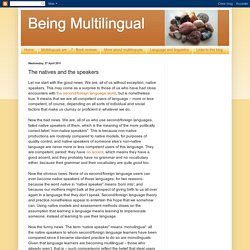
We are, all of us without exception, native speakers. The Psychology of Inside Out: A Beautiful Lesson in Emotional Intelligence « Under the Mask. Disney Pixar’s Inside Out i s a film that shows us how an ordinary event in life can take us through a remarkable emotional journey within ourselves.

Frankly, Inside Out may be more effective in teaching the concept of Emotional Intelligence better than any psychology text. What is STEAM? The STEM to STEAM movement has been taking root over the past several years and is surging forward as a positive mode of action to truly meet the needs of a 21st century economy.
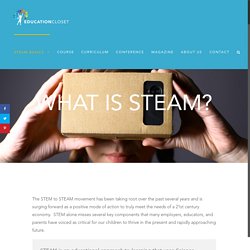
STEM alone misses several key components that many employers, educators, and parents have voiced as critical for our children to thrive in the present and rapidly approaching future. STEAM is an educational approach to learning that uses Science, Technology, Engineering, the Arts and Mathematics as access points for guiding student inquiry, dialogue, and critical thinking. The end results are students who take thoughtful risks, engage in experiential learning, persist in problem-solving, embrace collaboration, and work through the creative process. These are the innovators, educators, leaders, and learners of the 21st century! STEM vs. Tips on Learning to Talk.
Learning to talk is a process that starts at birth, when your baby experiences how voices can sound.
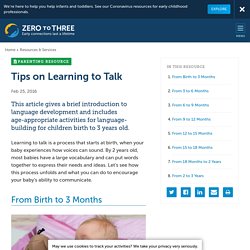
By 2 years old, most babies have a large vocabulary and can put words together to express their needs and ideas. Let’s see how this process unfolds and what you can do to encourage your baby’s ability to communicate. From Birth to 3 Months. A few more myths about speakers of multiple languages. Does multilingualism cause language delays and identity problems?
The British Council's Nayr Ibrahim busts a few more myths about speakers of multiple languages. Myth: Multilingualism causes language delay Raising children bilingually is sometimes believed to cause language delay. Does being bilingual make you smarter? Language teacher and researcher Miguel Angel Muñoz explains the latest research on how being bilingual affects your brain, ahead of a British Council seminar in Cardiff on whether learning a foreign language makes you smarter.
You can watch the live-streamed seminar on Tuesday, 3 June. More than half the world's population uses two or more languages every day It is hard to estimate the exact number of bilingual people in the world, as there is a lack of reliable statistics . Development Matters FINAL PRINT AMENDED. KQED Public Media for Northern CA. There was a direct correlation between the children who’d heard a lot of parent talk and how prepared they were to learn once they arrived at school.
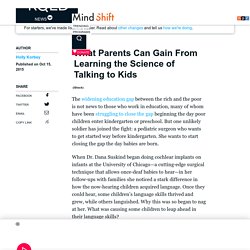
Hart and Risley wrote, “With few exceptions, the more parents talked to their children, the faster the children’s vocabularies [grew] and the higher the children’s IQ test scores at age 3 and later.” For Suskind, a lightbulb went on. Patricia Kuhl: The linguistic genius of babies. Alison Gopnik: What do babies think? How young children learn English as another language. By Opal Dunn, educational consultant and author Introduction Young children are natural language acquirers; they are self-motivated to pick up language without conscious learning, unlike adolescents and adults.
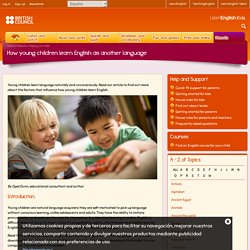
They have the ability to imitate pronunciation and work out the rules for themselves. Any idea that learning to talk in English is difficult does not occur to them unless it’s suggested by adults, who themselves probably learned English academically at a later age through grammar-based text books. Read the notes below about young children learning English as another language. The advantages of beginning early. The Power of Evening Routines. The word “structure” can evoke less than positive associations. It suggests constraints, which are never a good thing, right? Wrong. How do you speak 'Motherese'?
News BBC News Navigation Sections Previous Next Media player. The Woman Who Changed Her Brain: Barbara Arrowsmith-Young at TEDxToronto. How baby brains develop. Early childhood development – it’s not rocket science, it’s neuroscience! - Kathy Brodie Early Years Training. I was introduced to Mine Conkbayir when she contacted me about neuroscience informing early years practice, which I think is such an exciting, and growing, area of study.
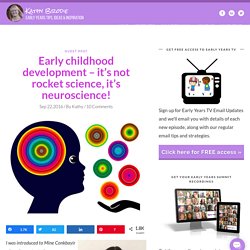
So I was very enthusiastic when she offered to do a guest post on this subject. Here she discusses how neuroscience can add another dimension to our understanding of child development: Like many individuals in this increasingly frantic world, I’m often busy juggling my responsibilities as a parent while I work and continue my studies – a very exciting journey as I try to achieve my PhD in early childhood education and neuroscience.
Having been a lecturer across a range of child care and education qualifications for the past 14 years, I continue to be bewildered by the lack of consistently embedded teaching of neuroscience and early brain development across these qualifications. Being Multilingual: You speak with an accent. I don’t. FAQ: Raising Bilingual Children. Why want bilingual children? There are many reasons, but the two most common are: 1) The parents speak different languages (say, an American woman and a Turkish man). 2) The parents speak the same language, but live in a community where most people speak something else (say, a Korean couple living in the USA).
Deb Roy: The birth of a word. Listen to Your Mother. Young children face a remarkable challenge in learning to use the language of their culture. Toddlers vary widely, however, in the rate at which they learn new words.1 A team of Harvard Graduate School of Education researchers set out to ask whether and how children's language environment can impact vocabulary development.
In their study of mother-child pairs from low-income families, they found that mothers who used many different words (not just many words) had toddlers with faster growth in vocabulary use. During the toddler and preschool years, most children learn to use hundreds of words, combining them into sentences and engaging in conversation with others. Let's Talk. What do babies need in order to learn and thrive?
One thing they need is conversation — responsive, back-and-forth communication with their parents and caregivers. This interactive engagement is like food for their developing brains, nurturing language acquisition, early literacy, school readiness, and social and emotional well-being. A dispiriting number of children don’t get that kind of brain-fueling communication, research suggests. Why does my toddler love repetition? How can I help my child to start talking? (Video) Multilingual Preschoolers. KQED Public Media for Northern CA.